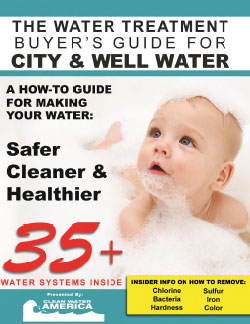News
Can I Filter the Water Coming into the Whole House?
You absolutely can! Whole House Carbon Filter Systems are among the most common home water treatment systems because of their effectiveness, ease of use and cost efficiency. If you want to filter the water throughout the whole house, this is a convenient and effective means of removing offensive tastes and odors. It also removes a […]
....read moreCan I Filter my Refrigerator Water and Ice Cubes Only?
Yes. Clean Water America can install an inexpensive inline filter cartridge behind your refrigerator. This involves pulling out the refrigerator each time you need to change the cartridge, but when taste and odor are a problem, it is well worth the effort. However, if your refrigerator’s ice maker is fed by the water supply line […]
....read moreCan I Filter Only the Kitchen Sink Water?
Yes, a point of use (POU) activated carbon filtration system is an effective method of improving water quality in the kitchen for cooking, drinking and ice cubes. It can be installed under the kitchen sink, with a third faucet, to supply the filtered drinking water. The carbon filter cartridges need to be replaced periodically and […]
....read moreWhat Does a POU Carbon Filter Remove?
Besides improving taste, odor and color, activated carbon in the Carbon Filter system effectively removes these wide range of impurities from your household water. The type of carbon material and it’s mesh size are an important factor in this removal. Asbestos Atrazine Benzene Chlorine Cryptosporidium Ethylene dibromide Giardia Herbicides Lead Mercury Pesticides Phenol Radon Trichloroethylene […]
....read moreHow Does a Carbon Filter Work?
The activated carbon material that is inside a tank or filter housing works like a sponge, attracting and holding contaminants as water passes through it. Carbon is very porous and has an unusually high surface area for contaminant removal. A teaspoon of activated carbon has the total surface area equal to a football field. This […]
....read moreWhat Maintenance is Required for a Softener?
Your softener will require backwashing periodically to wash all the collected hard minerals out of the softening bed. This backwash method can be completed by using either salt, which is the least expensive or potassium chloride. For folks on a salt restricted diet, potassium chloride is the preferred choice as it is safe for the […]
....read moreWhere Can I have My Water Tested?
You can either bring a sample of your household water to our Testing Laboratory at one of our Water Center Stores for a complete water analysis or call 239-489-4766 to have one of our professionals test your water in your home. Either way we can advise you on the best treatment system to solve your […]
....read moreIs Soft Water Pure Water?
Reducing the hardness of water to a softened state, has nothing to do with the purity of your drinking water. It can however, have a huge impact on the longevity of your clothes, the effectiveness of your appliances, the appearance of your dishes and glasses, and the cleanliness of your hair and skin. Hard Water […]
....read moreWhat Damage does Hard Water do to Homes?
Quite simply, hard water will eventually harm plumbing and fixtures,appliances and other household objects. The American Water Works Association reports that without a water softener the life of water heaters are cut in half, toilets by 70%, faucets by 40% and dishwashers and washing machines by 30%. In 1990 Purdue Universityʼs research team reports that […]
....read moreDoes the EPA have Guidelines for Acceptable Water Hardness?
The EPA has recommended guidelines for the amount of total dissolved solids in household drinking water but it is up to your state to endorse and regulate these guidelines. Then it is up to you to bring your water up to a standard that is preferred by you for your family. Hard Water and Soft […]
....read more

